
Written by Frederik Pohl, in a single evening, in 1966. Here’s an “experimental video” with Frederik Pohl reading his story:
There’s a complete unabridged narration available HERE too.
Posted by Jesse Willis

Written by Frederik Pohl, in a single evening, in 1966. Here’s an “experimental video” with Frederik Pohl reading his story:
There’s a complete unabridged narration available HERE too.
Posted by Jesse Willis

 The SFFaudio Podcast #117 – Scott, Jesse and Tamahome talk about audiobooks, the recent arrivals and the new releases.
The SFFaudio Podcast #117 – Scott, Jesse and Tamahome talk about audiobooks, the recent arrivals and the new releases.
Talked about on today’s show:
We have some genuine Science Fiction!, The Year’s Top Ten Tales Of Science Fiction Vol. 3 edited by Alan Kaster, Damien Broderick, Robert Reed, Steve Rasnic Tem, Ian R. Macleod, Luke Burrage, The Mars Phoenix has Science Fiction (2008), John W. Cambell, The Things by Peter Watts, 8 Miles should be title 12.1 Kilometers, the metric system can’t be sold politically in the U.S.A., florescent lightbulbs are unamerican, Corner Gas, Larry Niven, Harvest Of Stars by Poul Anderson, totalitarianism, Jerry Pournelle, The Boat Of A Million Years by Poul Anderson, immortality, utopia, Blackstone Audio, the French meter stick (is actually made of platinum and iridium not silver), Charles Stross, Free Apocalypse Al, Where are all the Ted Chiang audiobooks?, Steal Across The Sky by , The Astounding, The Amazing, And The Unknown by Paul Malmont, Robert A. Heinlein, Isaac Asimov, L. Ron Hubbard, The Chinatown Death Cloud Peril, Lester Dent, Doc Savage, H.P. Lovecraft, remixing pulp era authors with pulp era stories, Edgar Allan Poe, the boring cover of The Astounding, The Amazing, And The Unknown, Shadow On The Sun by Richard Matheson (a western that’s also supernatural horror), I Am Legend, Gatherer Of Clouds by Sean Russell, Vancouver Island, Dragon’s Time by Anne McCaffrey and Todd McCaffrey, Brian Herbert, Citadel Of The Lost by Tracy Hickman, is Harriest Klausner a robot?, Phil Gigante, SFSignal.com’s podcast interview with Tracy Hickman, Patrick Hester, Titus Awakes by Maeve Gilmore, Mervyn Peake, Simon Vance’s YouTube videos, Gormenghast (TV series), The Hitch-hiker’s Guide To The Galaxy, grotesque, fantasy with no magic and no intelligent species other than humans, “a fantasy of manners”, “a comedy of manners”, metaphors are not spoilers, The Iron Druid Chronicles: Hammered by Kevin Hearne, viking vampires, “someone give that dog a bacon latte”, Very Bad Men by Harry Dolan, Stories Of Your Life And Other Stories by Ted Chiang, Tower Of Babylon, Story Of Your Life, Hell Is The Absence Of God, The Prophecy, Christopher Walken, Viggo Mortensen, Elias Koteas, Combat Hospital (kind of a dramatic remake of MASH), Keanu Reeves, Blair Butler, comics, Northlanders Vol. 5: Metal And Other Stories, non-vampiric vikings, Brian Wood, Blade Vs. The Avengers, Marvel Zombies, Iron Man has a blonde twin brother, The Walking Dead, Robert Kirkman, George R.R. Martin, Dust by Joan Frances Turner |READ OUR REVIEW|, Rule 34 by Charles Stross, A Colder War, Saturn’s Children by Charles Stross |READ OUR REVIEW|, Friday by Robert A. Heinlein, interstellar sex, I Will Fear No Evil by Robert A. Heinlein, the meaning of “Rule 34”, “Space Porn – that’s one sexy nebula”, Luke Burrage’s review of Halting State, Choose Your Own Adventure, “turn to page 61 for the acidic death bath”, Infocom, Lesiure Suit Larry, Heaven’s Shadow by David S. Goyer, William Coon, Resume With Monsters by William Browning Spencer, “just added” vs. “new releases” on Audible.com, Steven Gould audiobooks, Vortex by Robert Charles Wilson, iambik audio, Open Your Eyes by Paul Jessup, Flashback by Dan Simmons, a brand new UNABRIDGED release of Neuromancer by William Gibson, Penguin Audio, American Gods by Neil Gaiman (multi-narrator), George Guidall’s reading of Neil Gaiman’s American Gods |READ OUR REVIEW|, American Gods as a TV series, Anansi Boys by Neil Gaiman |READ OUR REVIEW|, Odd And The Frost Giants by Neil Gaiman |READ OUR REVIEW| (even though it is too expensive), Deathworld by Harry Harrison is available on LibriVox narrated by Gregg Margarite, The City And The City by China Meiville, Embassytown, Hexed by Alan Steele, A Dance With Dragons by George R.R. Martin, NPR’s On Point podcast interview with George R.R. Martin, Sandkings, Nighflyers, A Song For Lya, Dreamsongs, Roy Dotrice, drones (unmanned aerial vehicles), Forever Peace by Joe Haldeman will be the subject for an upcoming podcast readalong, Upon The Dull Earth by Philip K. Dick will be the next SFFaudio readalong, what contest should we hold to give away The Selected Stories Of Philip K. Dick Volume 1 (and 2)?, rural fantasy, A Good Story Is Hard To Find podcast #009 The Mystery Of Grace by Charles de Lint, The Space Merchants by Frederik Pohl and C.M. Kornbluth.
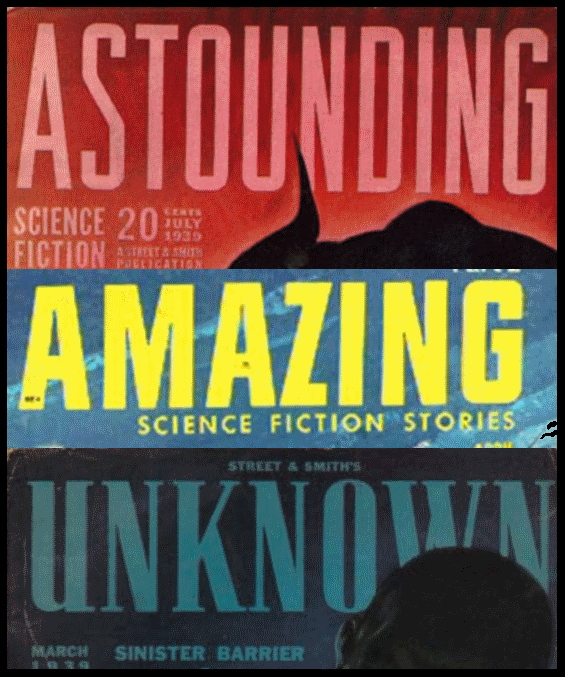
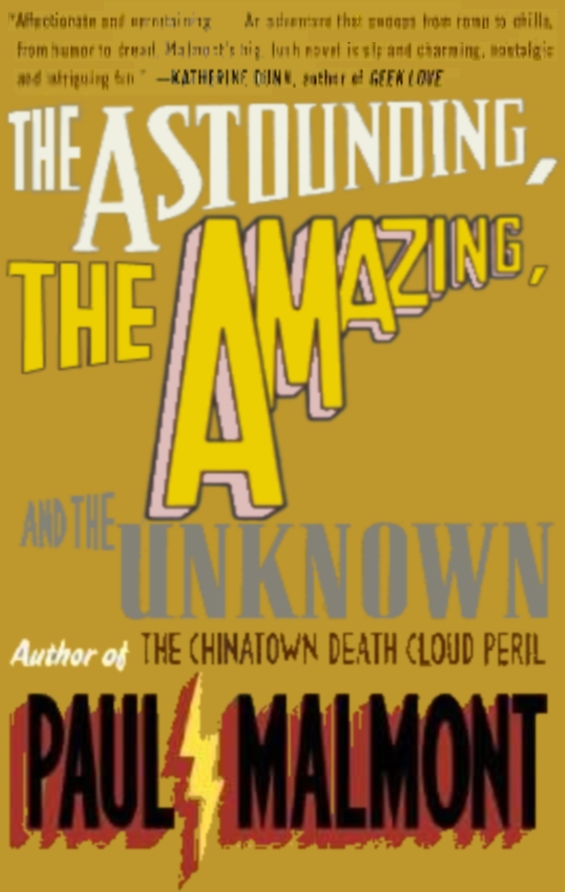
Posted by Jesse Willis

As mentioned on SFFaudio Podcast #116 there is no commercially available audiobook edition of The Space Merchants. What I failed to mention, however, is that there is a two-part radio dramatization from 1957:
 CBS Radio Workshop – The Space Merchants
CBS Radio Workshop – The Space Merchants
Based on the novel by Frederik Pohl and C.M. Kornbluth; Performed by a full cast
2 MP3 Files – Approx. 1 Hour [RADIO DRAMA]
Broadcaster: CBS
Broadcast: February 17th and 24th, 1957
Provider: archive.org
Mitch Courtenay, portrayed by Staats Cotsworth, is a rising star copywriter for the Fowler Schocken Advertising Agency. He’s just been given the company’s biggest campaign – he must promote the colonization of Venus. You’d think would be no problem at all given that Earth is an over-populated planet with polluted air and played-out resources. But there’s a wrinkle – somebody is working against Mitch, and an underground rebellion threatens the very foundations of Earth’s economy!
First serialized in the March through May 1952 issues of Galaxy Science Fiction under the title Gravy Planet, The Space Merchants by Frederik Pohl and C.M. Kornbluth was one of the most popular science fiction novels of the 20th century. Here’s the first ever depiction from it, by Ed Emshwiller, for the cover story from the March 1952 issue of Galaxy:
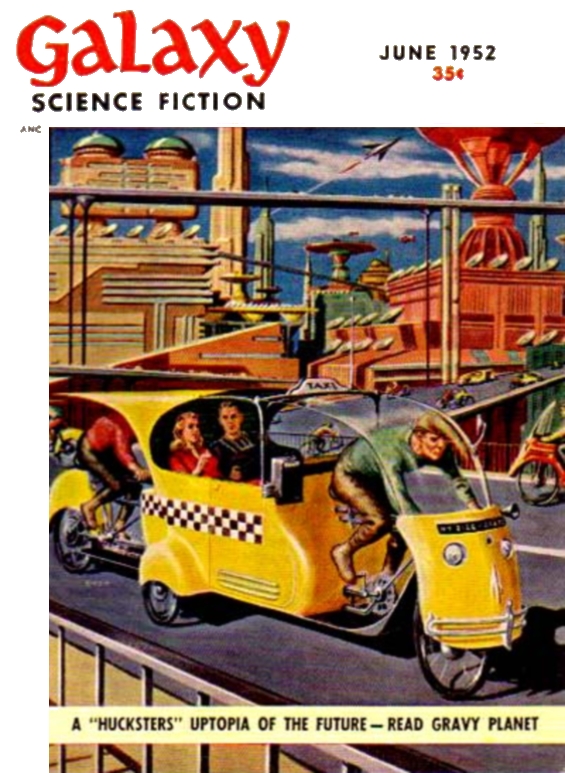
Darrell Sweet’s cover for the 1976 Ballantine Books paperback edition took inspiration from the original magazine appearance:
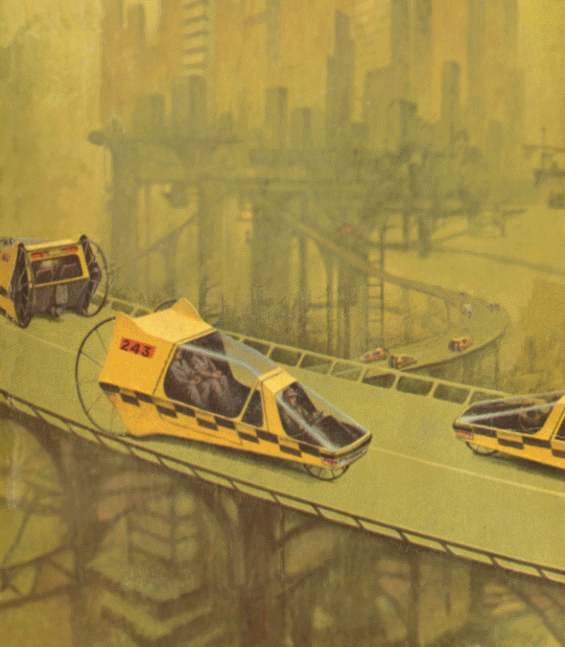
Whereas Steve Stone’s cover art for the Orion / Gollancz – SF MASTERWORKS (Volume 54) edition seems more inspired by Blade Runner:
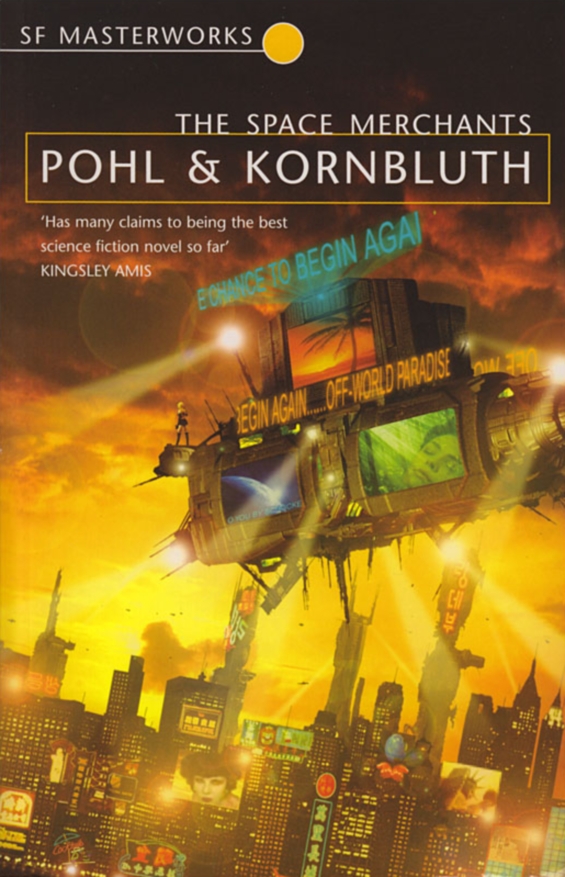
[Thanks Bill]
Posted by Jesse Willis

 The SFFaudio Podcast #116 – Scott, Jesse, Tamahome and Professor Eric S. Rabkin talk about The Space Merchants (aka Gravy Planet) by Frederik Pohl and C.M. Kornbluth
The SFFaudio Podcast #116 – Scott, Jesse, Tamahome and Professor Eric S. Rabkin talk about The Space Merchants (aka Gravy Planet) by Frederik Pohl and C.M. Kornbluth
Talked about on today’s show:
Frederik Pohl’s blog, differences between Gravy Planet and The Space Merchants Coca-Cola vs. Yummy Cola, com-pocalypse (a commercial apocalypse), advertizing, conservationists -> connies (or consies) is an analogue for communists -> commies, Tristan Und Isolde, Costa Rica, Chicken Little, Fowler Shocken, 1950s. Jews in “the Science Fiction ghetto”, H.L. Gold, Phlip Klass (William Tenn), Ray Bradbury, Isaac Asimov, the Wikipedia entry for The Space Merchants, a study guide for The Space Merchants, Levittown, Man Plus, The Merchants War, Pohl’s interest in psychiatry, Gateway, structural problems in The Space Merchants, identity theft, a hero’s journey, The Odyssey, katabasis, banana republic, the United Fruit Company, Cuba, U.S. Marines in Columbia, Vance Packard’s The Hidden Persuaders, Jack O’Shea, little people are the perfect astronauts, pilots tend to be small people, the continuing relevance of The Space Merchants, “transformed language”, The Left Hand Of Darkness by Ursula K. Le Guin, “the Glaciers didn’t freeze overnight” (Rome wasn’t built in a day), what side do you oil your bread on, pedaling your Cadillac into the future, are there more cars in the U.S.A. than people?, William Gibson, The future is already here — it’s just not very evenly distributed, corporatocracy, Oliver Stone, does Wall Street run the world or is it Madison Avenue?, representative government per capita (per head) or ad valorem (to value), The Marching Morons, dystopia, utopia, citizen vs. consumer, CBC’s The Age Of Persuasion podcast, the effectiveness of advertizing, feminine hygine products, “it has wings”, coffiest vs. Starbucks, Jon Huntsman, Tim Pawlenty, how effective is advertizing?, saturation of advertizing vs. the message of advertizing itself, does advertizing work?, who consumes dog food?, soyaburger, Chlorella, algae, soylent red, despite what he says Eric is not a jerk vegetarian, seitan (wheat gluten food), Moby Dick, Mountain Dew in the U.S.A. vs. Mountain Dew in Canada, energy drinks, Jolt Cola, phial vs. vile, Philip K. Dick’s Do Android Dream Of Electric Sheep?, the Penfield Mood Organ, caffeine, Tamahome likes unsweetened chocolate, what did Montezuma drink all day long?, does has the internet lessen the impact of advertizing?, the spillage from penis enhancement, Eric bought a wide cross section of pornography, “genuine spurious placebo”, Boeing “forever new frontiers”, the Dubai Ports controversy, Cisco Systems, I, Robot, Minority Report, gesture recognition, Yelp, Wikileaks: U.S. diplomats pressed Boeing deals, Bombardier, “he came from an old family”, Kennedy, Bush, Heddy and Hester, Hedy Lamarr, Hester Prynne, The Scarlet Letter by Nathaniel Hawthorne, Alfred Bester’s The Demolished Man, The Stars My Destination, “Eight sir, seven sir, six sir, five sir, four sir, three sir, two sir, one. Tenser, said the Tensor, Tenser said the Tensor. Tension, apprehension, and dissension have begun.” Rebecca Black’s Friday is a train wreck, Arthur C. Clarke‘s Tales From The White Heart, colonizing your brain, “you haven’t read a book until you’ve talked about it”, is solitary reading a different kind of thing than social reading?, satire, Monty Python’s “The Funniest Joke In The World” sketch, advertizing in books, advertizing in paperback novels, propaganda, recommendation vs. advertizing, making something available vs. thrusting it upon you, metaSFFaudio, The Reapers Are The Angels by Alden Bell, Flannery O’Connor with zombies, why SFFaudio doesn’t link to Amazon.com, Morning Joe, Fox News, Scott is now a politician, Douglas Adams, political debate being replaced by sound bites, Jon Stewart vs. Sean Hannity, Jon Stewart’s appearance on Crossfire, Will Rogers, communication vs. advertizing, jokes are revelations, brand awareness, why do kids want to see Transformers 3?, Cedar Rapids is a coming of age movie about the nature of friendship, why is there no commercial released audiobook of The Space Merchants?, The Puppet Masters by Robert A. Heinlein, Them!, anti-consumerism (anti-Americanism), tobacco packaging warning messages (are ads), the tobacco industry vs. the anti-tobacco industry, church advertizing, Scientology doesn’t sell the same message as many other religions, L. Ron Hubbard, A.E. van Vogt, Dianetics, the premise of Null-A, Friedrich Nietzsche.
Illustrations from the original serialization of Gravy Planet (aka The Space Merchants) in Galaxy Science Fiction magazine’s July August and September 1952 issues:
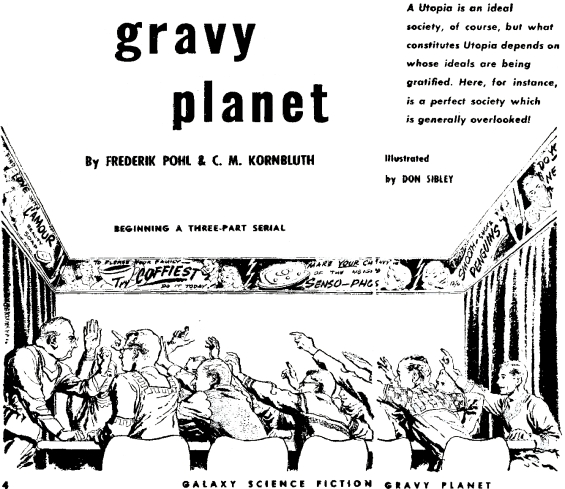
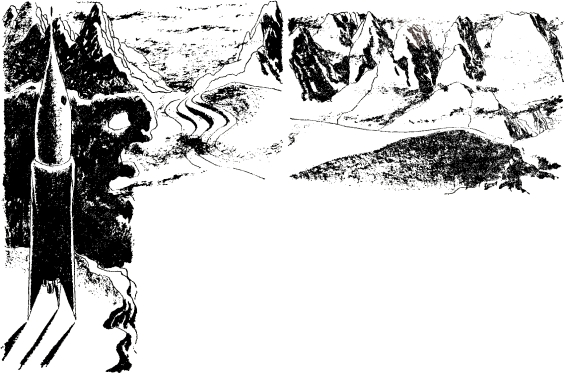
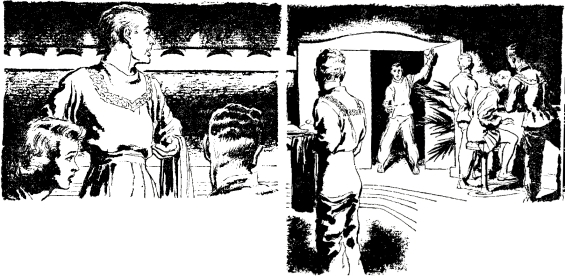
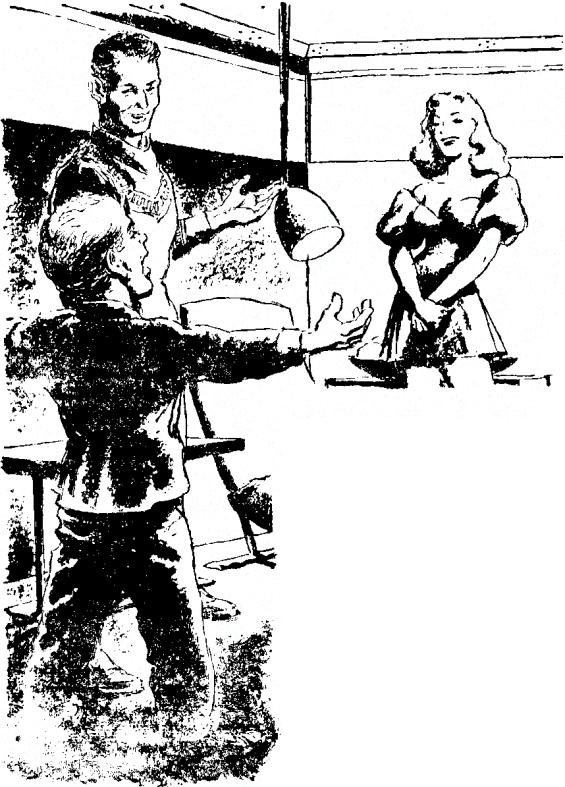

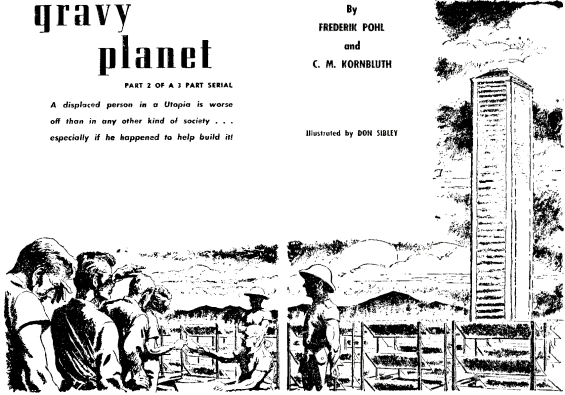
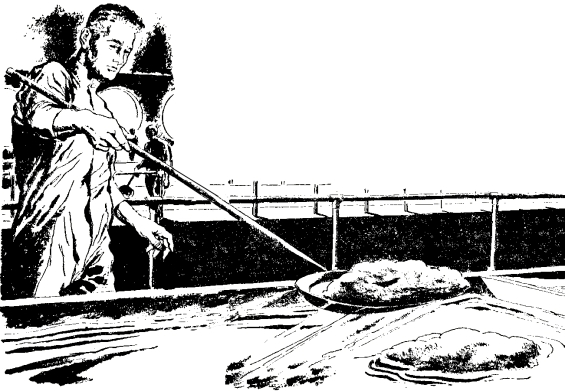
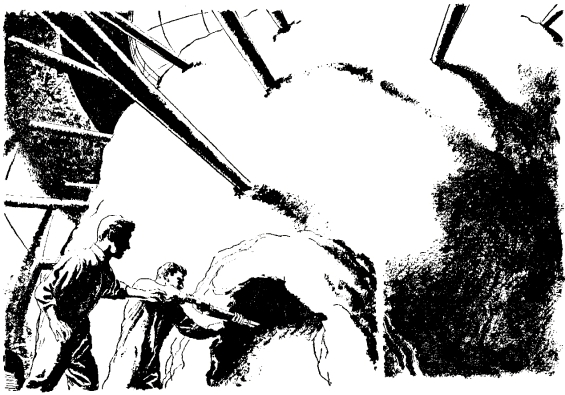
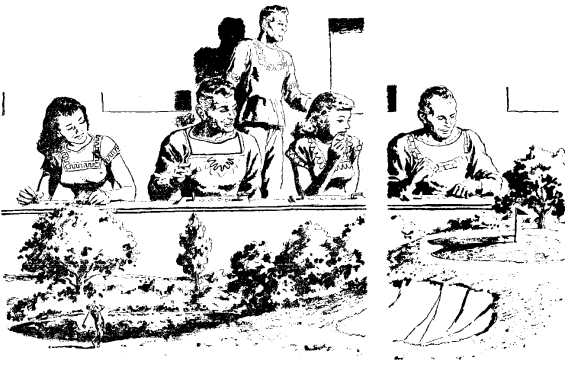
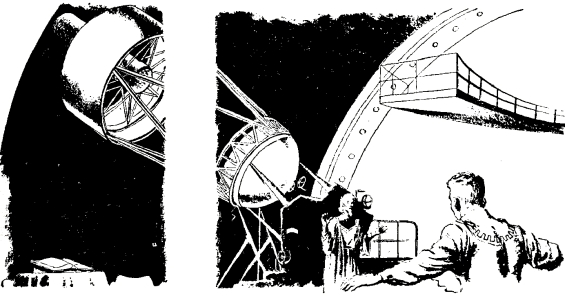
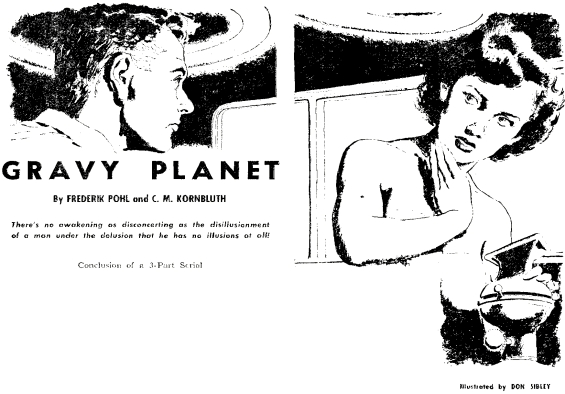
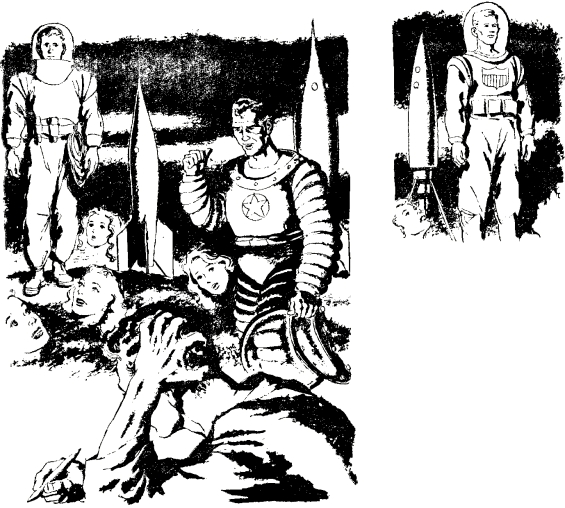
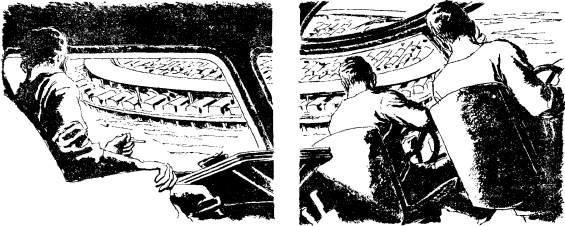
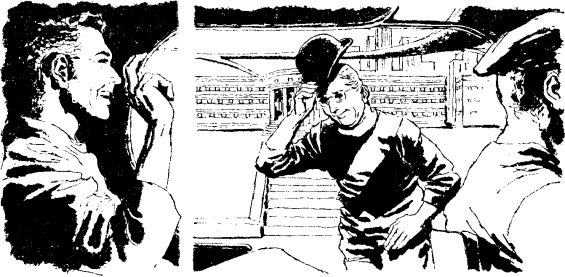
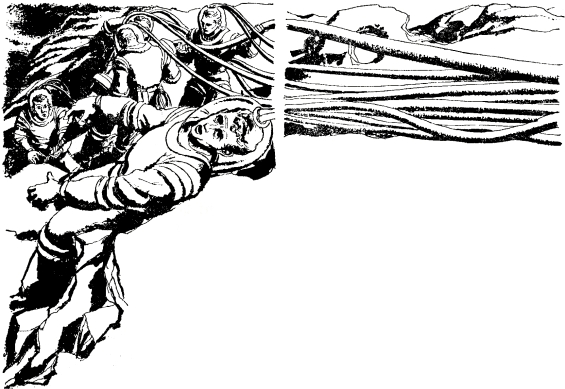
Posted by Jesse Willis

 The SFFaudio Podcast #113 – Jesse and Eric S. Rabkin talk about Stupidity and Intelligence in Science Fiction (and Fantasy).
The SFFaudio Podcast #113 – Jesse and Eric S. Rabkin talk about Stupidity and Intelligence in Science Fiction (and Fantasy).
Talked about on today’s show:
Johann Wolfgang von Goethe’s The Sorcerer’s Apprentice, Mickey Mouse, Fantasia, Christopher Marlowe‘s The Tragicall History of the Life and Death of Doctor Faustus, Brothers Grimm Clever Hans (the fairy tale), Clever Hans (the horse), War With The Newts by Karel Čapek, Excerpt from (Book Two – Up the Ladder of Civilisation), trephination, “there are some things man was not meant to know”, evil science and evil scientists, R.U.R., Mary Shelley’s Frankenstein, Frankenstein is an egotist whereas the creature wants community, Chapter 11 of Frankenstein, intellect vs. empathy, “One man’s life or death were but a small price to pay for the acquirement of knowledge which I sought.”, the ideology of intelligence is suspect, Gulliver’s Travels, Laputa, philosophers, The Clouds by Aristophanes, “head in the clouds”, BBC Radio dramatization of Lysistrata, The Black Cloud by Fred Hoyle, “the big bang”, telepathy, Gregg Margarite, “Genius in not a biological phenomenon.”, “stupid people can have smart babies and smart people can have stupid babies”, eugenics, sterilization programs, “we know so little about what we mean by intelligence”, “we breed against the outliers”, “If I see further than others it is because I stand on the shoulders of giants”, Sir Isaac Newton, Newton vs. Leibniz, Darwin vs. Wallace vs. Darwin’s grandfather, Robert A. Heinlein, “steam engine time”, Columbus and the egg, humans (persons) can compound our intelligence, Flowers For Algernon by Daniel Keyes, Charly, “we shouldn’t define humanity by our intelligence”, The Time Machine by H.G. Wells, flowers from Weena, “fundamental humanity has to do with emotion and not intelligence”, He, She and It by Marge Piercy, programming a robot with stories, Yod is a robot-like golem, “it was immoral to create a conscious weapon”, The Doomsday Book by Connie Willis, Eric is the world’s least reliable critic of The Doomsday Book, The Invisible Man by H.G. Wells, philosophy of science, the meaning of weapon, We by Yevgeny Zamyatin, tool vs. weapon, “we have one mad scientist after another”, Gojira!, Ozymandias, Watchmen, Understand by Ted Chiang, “talking to babies”, “if everyone in the world around you is an idiot…what kind of relationship can you have with the world”, His Masters Voice by Stanisław Lem, Hogarth is an incredibly intelligence person, Edgar Allan Poe, Audible Frontier’s Solaris: The Definite Edition, The Futurological Congress, Isaac Asimov, Eric puts on his professorial hat, nous, the etymology of the word “intelligence”, Asimov reads between the lines for you, the etymology of the word “stupid”, what’s with the word “sentient” in Science Fiction?, Beyond Lies The Wub by Philip K. Dick, ansible, “sentience is the bag that we put all our coding for equally human”, was Larry Niven the prime promulgator of the SF version of “sentience”?, The Island Of Doctor Moreau by H.G. Wells, “words are a map on the world”, The Time Machine, evolution and the clash of the classes, Wells respects the intelligence of his readers, Morlocks vs. Eloi, the King James version of the Bible, “Eloi Eloi Lama Sabachthani“, Hugo Gernsback, Amazing Stories, “whizz bang sensofwunda”, The New Accelerator by H.G. Wells, “the warp drive is not important”, “the ansible is not important”, “we are all time travelers”, “in Wells’ greatest works he leaves some part of the story open”, “but whether this was a reprieve for us or them only time will tell”, Experiment In Autobiography by H.G. Wells, The Gods Themselves by Isaac Asimov, “Against stupidity the gods themselves contend in vain”, Friedrich Schiller, reporters became cynical now they just go see what’s happening on Facebook, The Marching Morons by C.M. Kornbluth is public domain, much of Kornbluth is PD because he died so young, The Space Merchants by Frederik Pohl and C.M. Kornbluth, Little Black Bag by C.M. Kornbluth, Idiocracy, stupid people have lots of (stupid) babies (?), what’s wrong with The Marching Morons?, PLENTY!, “The Marching Chinese”, Thomas Robert Malthus, eugenics and dysgenics, what ties do genetics and intelligence have?, a very high fraction of American presidents have been left handed, immigrant groups produce terrific comedians, Microcosmic God by Theodore Sturgeon, storing up ideas for my “word hoard”.

Posted by Jesse Willis

 The SFFaudio Podcast #112 – a complete and unabridged reading of The Marching Morons by C.M. Kornbluth. It is wonderfully narrated for us by William Coon of Eloquent Voice.
The SFFaudio Podcast #112 – a complete and unabridged reading of The Marching Morons by C.M. Kornbluth. It is wonderfully narrated for us by William Coon of Eloquent Voice.
The Marching Morons is a Science Fiction novella written by Cyril M. Kornbluth, originally published in Galaxy Science Fiction’s April 1951 issue. It has been famously anthologized in The Science Fiction Hall of Fame, Volume Two (B).
The story is set hundreds of years in the future: the date is 7-B-936. Its protagonist is John Barlow, a man from the past put into suspended animation by a freak accident involving a dental drill and anesthesia. He is revived in a dystopic future where the dysgenic breeding of humans has, in combination with intelligent people not having many children, overwhelmingly populated the world with morons. An elite few non-idiots must work slavishly to keep the world productive. Barlow, who was a shrewd con man in his day, has a solution to sell to the elite.
In his introduction to The Best Of C.M. Kornbluth Frederik Pohl explains some of the inspiration to The Marching Morons. Apparently the work was written after Pohl suggested that Kornbluth write a follow-up story to The Little Black Bag (a classic Kornbluth short story). In contrast to the “little black bag” arriving in the past from the future, Kornbluth wanted to write about a man arriving in the future from the past. To explain sending a man to the future, Kornbluth borrowed from David Butler’s Just Imagine (1930) science fiction film in which a man is struck by lightning, trapped in suspended animation, and reanimated in the future.”
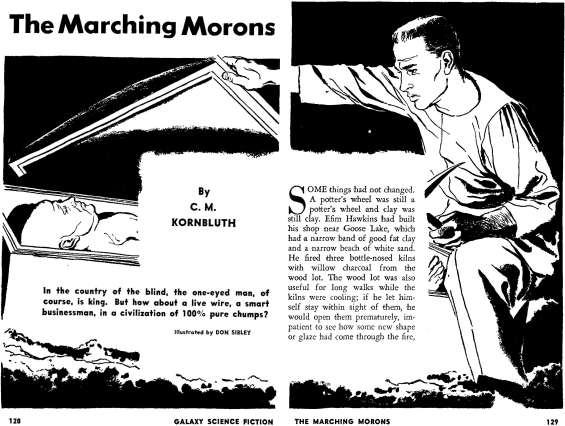
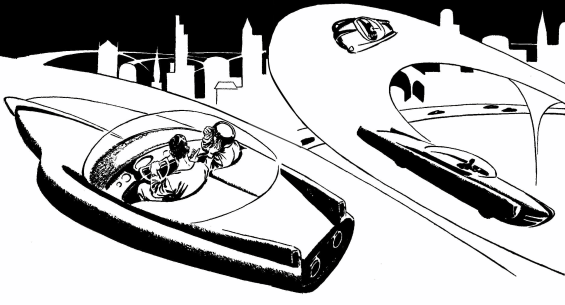
Posted by Jesse Willis